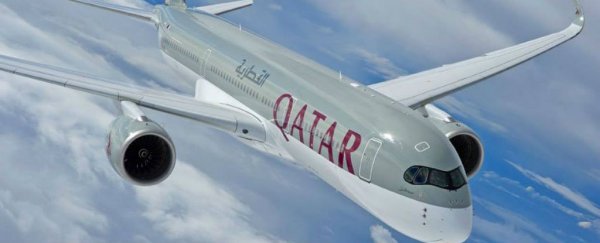One of the biggest downsides to a long-haul flight - aside from being cooped up in a metal box for hours - is waiting for your body to readjust to the new time zone once you touch down. But commercial aircraft companies Airbus and Qatar Airways think they might have found a solution to the perennial jetlag problem with their latest aeroplane.
The A350 XWB comes with a variety of improvements designed to minimise that groggy feeling you get from flying halfway around the world. One of the main innovations is a system of LED lights inside the cabin that are designed to change colour to mimic the Sun's natural glow - and they're programmed to fit in with our bodies' natural circadian rhythms no matter what the actual time is.
What's more, the plane's filtering system refreshes the air inside the cabin every 2 or 3 minutes, and keeps it pressurised at the equivalent of an altitude of 1,828.8 metres (6,000 feet). Again, Airbus says this should improve comfort for passengers and minimise the effects of jetlag once they step back onto the ground.
There's much more to this plane besides anti-jetlag measures. Over 50 percent of the frame is made from carbon fibre-reinforced plastic, reducing the weight of the aircraft and of course the amount of fuel required for long-haul flights. Larger and wider wings, together with flaps that follow the flight path direction rather than the wind, combine to create a 25 percent improvement in the plane's fuel economy over comparable models currently in the sky, according to Airbus.
In terms of passenger comfort, the economy seats are a little wider and a little further apart, and it's easier to get down the aisles. The interior design of the cabin can be adapted by individual airlines, depending on how they want to make use of the space (and how many business class passengers they're expecting).
"The design process was about optimisation, pushing the constraints, and opening up the box of solutions," Alain De Zotti, chief engineer of the A350 XWB program, told Fast Company. "We're trying to make the jet relevant for the future. There's an open architecture that can evolve to welcome new functions and can cope with the evolution of technology."
Qatar Airways is one of the first airlines to introduce an A350 model to its fleet, but other companies have already placed further orders for the aircraft. If you find jetlag a particular problem when flying between countries, you might want to look out for the new plane in the airport schedules. With US$15 billion in funding and 2,600 hours of test flights behind it, the plane is expected to be in service for the next 30 years.
